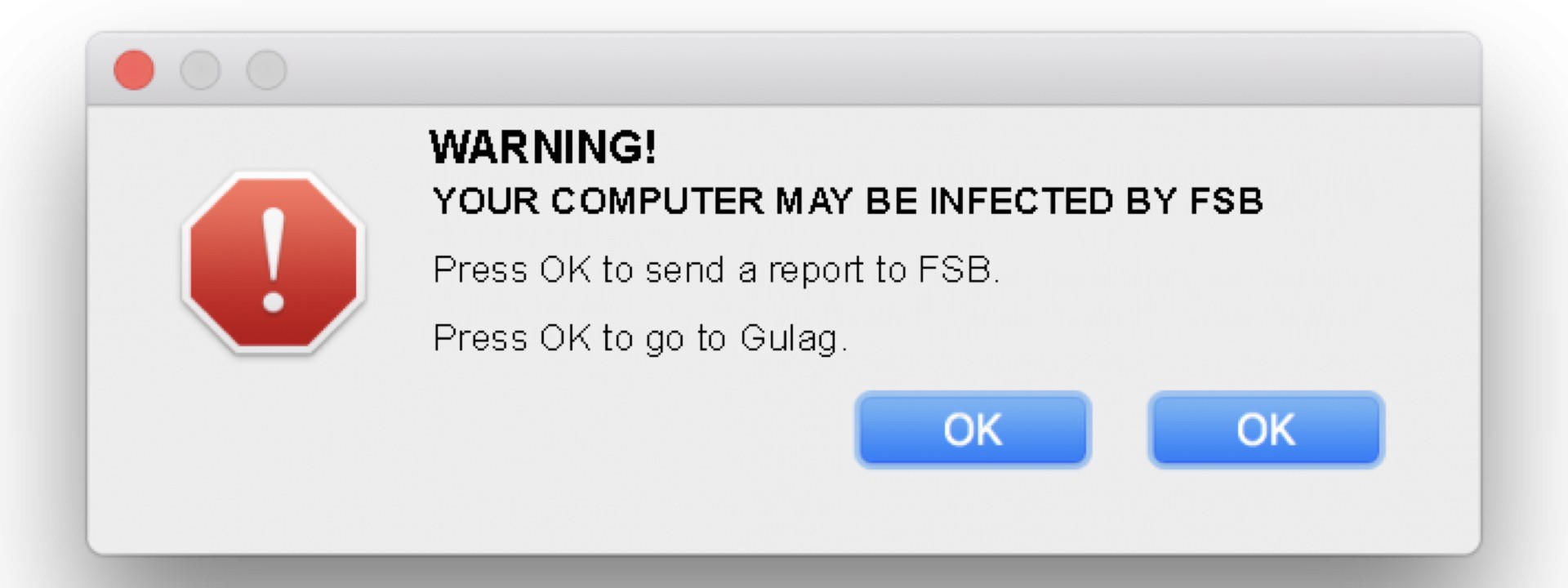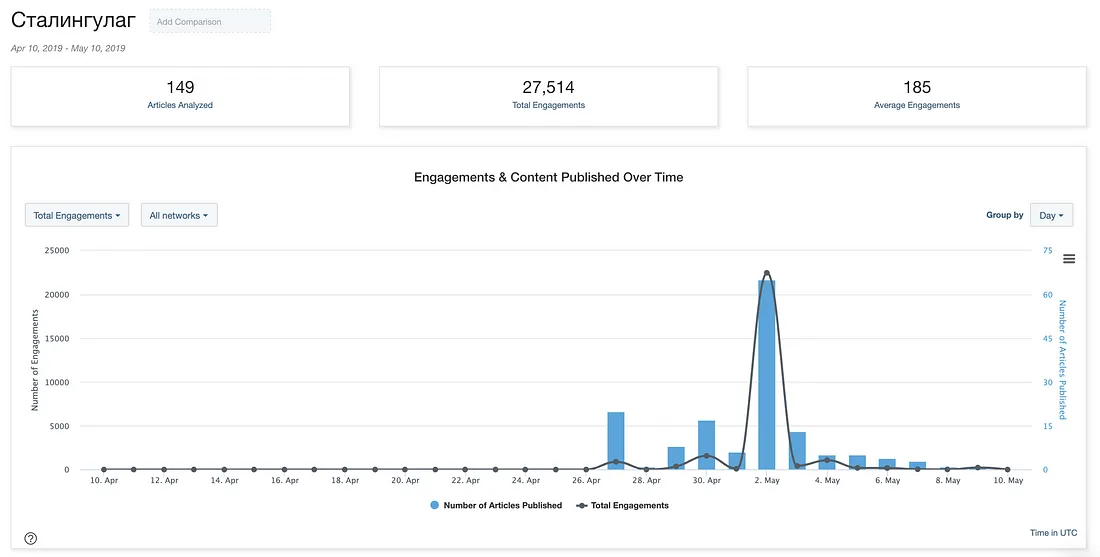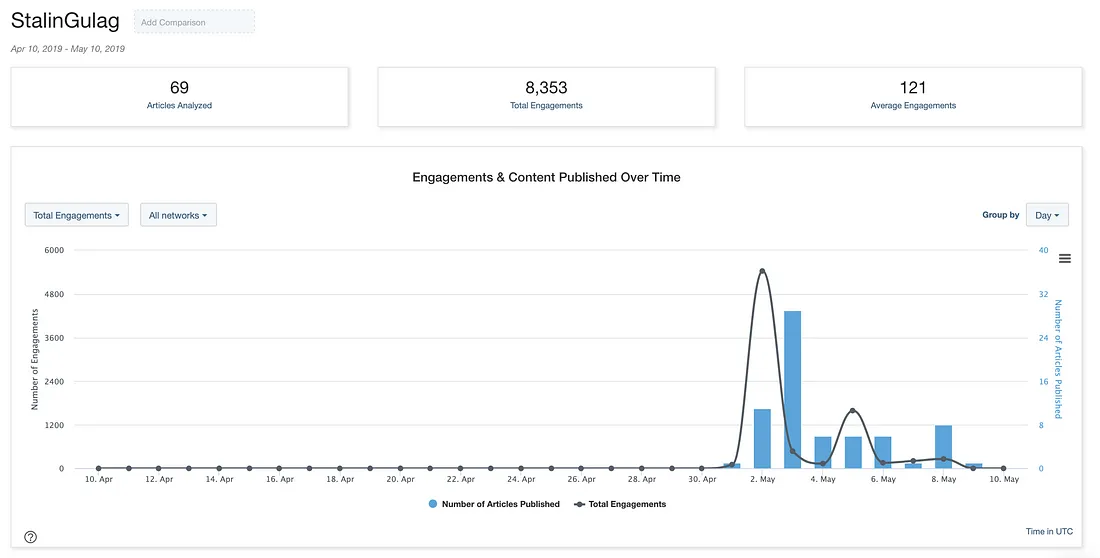@StalinGulag Outs Himself After Suppressive Raid by Russian Authorities
Russia’s security service raided the home of one of Putin’s most vocal — and formerly anonymous — critics
@StalinGulag Outs Himself After Suppressive Raid by Russian Authorities

BANNER: (Source: @EtoBuziashvili/DFRLab)
The identity of @StalinGulag, the hugely popular account that used dark humor to expose everyday injustices in Russia on Twitter and Telegram, remained one of the country’s best-kept secrets for years. At the beginning of May 2019, however, the Russian security service (FSB) raided the house of the man behind the persona, leaving no other choice but to reveal his identity as Alexander Gorbunov.
The state of free speech in Russia is dismal — being rated 149 out of 180 countries for press freedom. Russia recently enacted a law allowing individuals to be jailed for criticizing the authorities; anonymity is thus the only way to express one’s views openly and exercise freedom of speech in the country of 144 million.
The @StalinGulag case could have a further chilling effect on free speech by discouraging anonymous social media users from expressing their views.
Freedom of Speech, but No Freedom After Speech
Gorbunov, who lives in the North Caucasian Republic of Dagestan, decided to reveal his identity after police raided his home, interrogated his family, and levied unsubstantiated accusations that he had ties to terrorist groups.
Я – Сталингулаг и я больше не аноним https://t.co/1PeLronicM
— Сталингулаг (@StalinGulag) May 2, 2019
Known for exposing everyday injustices in Russia and underlining the absurdities of Putin’s regime via dark humor and wit, @StalinGulag gained a substantial online following.

In 2017, Russian opposition leader Alexei Navalny referred to the @StalinGulag account as “the most important political columnist in Russia.” Navalny, a fierce critic of Russian President Vladimir Putin and his regime, has been jailed and released on more than 10 separate occasions, likely a tactic of indirectly muting his criticism as well as of sending a message to other vocal critics.
«Левада-центр»: Треть россиян испытывает удовлетворение, когда узнает об арестах чиновников
Остальная часть опрошенных, я так понимаю, сами чиновники
— Сталингулаг (@StalinGulag) May 7, 2019
Депутат Госдумы Дмитрий Ионин открыл стрельбу из автомата (холостыми) рядом с жилыми домами. Свои действия он объяснил: «Я нажал — ой, ни фига себе»
В принципе, это универсальное объяснение жизни депутата: я нажал – ой, ни фига себе, закон принят
— Сталингулаг (@StalinGulag) May 5, 2019
The 27-year-old Gorbunov, who uses his right index finger to type due to his spinal muscular atrophy, says he chose the handle @StalinGulag “as a form of trolling.” Gulag, of course, is the Russian name for Soviet forced labor camps. Soviet dictator Joseph Stalin actively employed gulags for political repression, sending dissidents to the labor camps, where more than one million people died.
The issue of anonymity has become increasingly important for internet users in Russia. As part of the Kremlin’s efforts to crack down on dissent and assert greater control over the internet, Putin signed a controversial law in March 2019 that criminalized the criticism of the government and the dissemination of what the government deemed as “fake news.” This law empowered Russian authorities to block websites critical of Putin’s regime.
In light of the Kremlin’s curtailing of free expression, maintaining anonymity on social media platforms remains the safest way to express dissenting views. Increasingly, even that right to anonymity is under threat.
Online Engagement and Mentions of @StalinGulag
@StalinGulag had approximately 1.1 million Twitter and 375,000 Telegram followers at the time of writing, though his total reach is estimated to be several million more. By comparison, Putin’s official Twitter account, @KremlinRussia, had around 3.3 million followers, and @Sandy_Mustache, another popular anti-regime Russian Twitter account, had roughly 412,000 followers. While his tweets frequently received around 11,000 likes and 2,000 retweets, the account name did not often appear outside of his own posts prior to his outing.
Using the online analytics tool Sysomos, the DFRLab scanned for mentions of the word “StalinGulag” on online platforms in both English and Russian between April 11 and May 10, 2019. Sysomos registered 29,880 mentions of the term “StalinGulag” (“Сталингулаг”) in Russian across all platforms. Daily mentions of term were zero until April 26 — the day Russian police raided Gorbunov’s house — and increased sharply on April 27, when the media likely began reporting on the incident. Mentions remained low for four days, before peaking on May 2, the day Gorbunov revealed his identity.

Sysomos registered 76,000 mentions of the word “StalinGulag” in English across all platforms. Daily mentions of the word fluctuated during the period of analysis, before peaking on May 2, 2019.

A BuzzSumo analysis of articles containing the keyword “Сталингулаг” in Russian published within the period of analysis suggested that total engagement across the Russian online platforms was 27,521, peaking on May 2 with up to 23,000 engagements. Both the number of articles published and the total engagements peaked on May 2.

A BuzzSumo analysis of articles containing the keyword “StalinGulag” in English published within the period of analysis suggested that total engagement across the English online platforms was 8,353, peaking on May 2 with up to 5,000 engagements. In contrast to the Russian online platforms, the number of articles published and the total engagements did not peak on the same day. Engagement was highest on May 2; the number of articles published, however, peaked on May 3.

Both Sysomos and BuzzSumo showed that the @StalinGulag account was the subject of extensive discussion online on the day that Gorbunov revealed his identity. The case continues to generate discussion. Even in the face of the recent controversial law criminalizing criticism of the Russian government and Russian internet users’ growing fear of expressing their thoughts freely, @StalinGulag’s unveiling attracted widespread attention online in Russia. That rapt attention may indicate the importance the Russian public places on the protection of free speech.
Register for the DFRLab’s upcoming 360/OS summit, to be held in London on June 20–21. Join us for two days of interactive sessions and join a growing network of #DigitalSherlocks fighting for facts worldwide!

